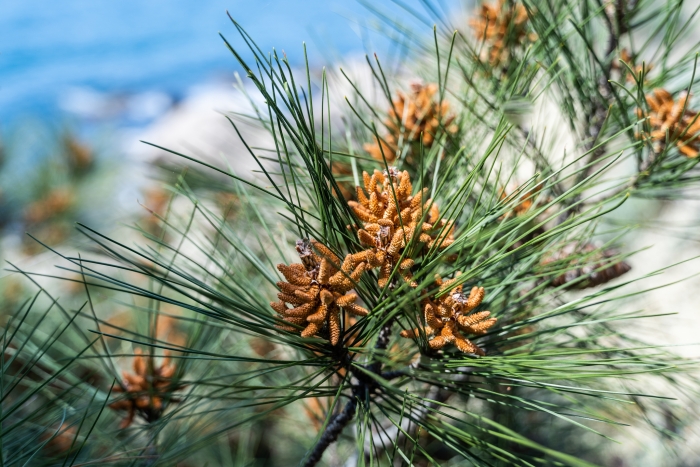Turkish Pine
(Pinus brutia)
Turkish Pine (Pinus brutia)
/
/

Евгений Егорейченков
CC BY 4.0
Image By:
Евгений Егорейченков
Recorded By:
Copyright:
CC BY 4.0
Copyright Notice:
Photo by: Евгений Егорейченков | License Type: CC BY 4.0 | License URL: http://creativecommons.org/licenses/by/4.0/ | Rights Holder: Евгений Егорейченков | Publisher: iNaturalist | Date Created: 2019-05-04T12:31:50-07:00 |









































Estimated Native Range
Summary
Pinus brutia, commonly known as Turkish Pine, is an evergreen tree native to Mediterranean coastal regions, including Turkey, and extending to the eastern Aegean Islands, parts of the Middle East, and the Crimea. It thrives in various habitats, including coastal Mediterranean forests, lower mountain slopes, and rocky areas, where it forms mixed forests with other pine species or occurs in pure stands. Turkish Pine typically reaches a height of 20–35 meters (66–115 ft) with a trunk diameter of up to 1 meter (3.3 ft). The bark is a distinctive orange-red, thick and deeply fissured at the base, becoming thinner and flaky higher up the trunk. The tree’s needles are arranged in pairs and are bright green, adding to its ornamental value.
Turkish Pine is valued for its heat and drought tolerance, making it a suitable choice for hot, dry climates. It is widely used as an ornamental tree in parks and gardens, particularly in regions such as southern California, Utah, New Mexico, Nevada, Arizona, and central Texas. Its ability to withstand urban conditions also makes it a good candidate for urban forestry. Turkish Pine requires full sun exposure and performs best in well-drained soils with medium moisture levels. While it is generally low-maintenance, it can be susceptible to pine wilt disease and certain pests such as the pine processionary moth. Gardeners should be aware of its potential to become invasive in some areas outside its native range, where it can outcompete local flora.CC BY-SA 4.0
Turkish Pine is valued for its heat and drought tolerance, making it a suitable choice for hot, dry climates. It is widely used as an ornamental tree in parks and gardens, particularly in regions such as southern California, Utah, New Mexico, Nevada, Arizona, and central Texas. Its ability to withstand urban conditions also makes it a good candidate for urban forestry. Turkish Pine requires full sun exposure and performs best in well-drained soils with medium moisture levels. While it is generally low-maintenance, it can be susceptible to pine wilt disease and certain pests such as the pine processionary moth. Gardeners should be aware of its potential to become invasive in some areas outside its native range, where it can outcompete local flora.CC BY-SA 4.0
Plant Description
- Plant Type: Tree
- Height: 60-115 feet
- Width: 30-50 feet
- Growth Rate: Moderate
- Flower Color: N/A
- Flowering Season: Non-Flowering
- Leaf Retention: Evergreen
Growth Requirements
- Sun: Full Sun
- Water: Medium
- Drainage: Medium, Fast
Common Uses
Bird Garden, Deer Resistant, Drought Tolerant, Fragrant, Low Maintenance, Rabbit Resistant, Street Planting
Natural Habitat
Native to Mediterranean coastal regions, lower mountain slopes, and rocky areas
Other Names
Common Names: Calabrian Pine, Türkische Kiefer
Scientific Names: , Pinus brutia, Pinus pithyusa, Pinus halepensis subsp. brutia, Pinus brutia var. caucasica,
GBIF Accepted Name: Pinus brutia Ten.